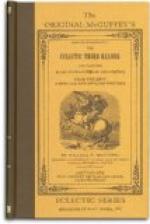98 Eclectic series. not very fine. I eat birds sometimes, but I am tired of them just now, having lately devoured four young robins; so you may go. But, bird or mouse, it will be your best policy to keep out of my way hereafter.” 12. The meaning of this fable is, that a person playing a double part may sometimes escape danger; but he is always, like the bat, a creature that is disgusting to everybody, and shunned by all. S. G. Goodrich—Adapted.
Lesson XXXVIII.
A SUMMER DAY.
1. This is the way the morning dawns:
Rosy tints on flowers and trees,
Winds that wake the birds and bees,
Dewdrops on the fields and lawns—
This is the way the morning dawns.
2. This is the way the sun comes up: Gold on brook and glossy leaves,
Thirdreader. 99
Mist that melts above the sheaves,
Vine, and rose, and buttercup—
This is the way the sun comes up.
0
3. This is the way the river flows:
Here a whirl, and there a dance;
Slowly now, then, like a lance,
Swiftly to the sea it goes—
This is the way the river flows.
100 Eclectic series.
4. This is the way the rain comes down:
Tinkle, tinkle, drop by drop,
Over roof and chimney top;
Boughs that bend, and skies that frown—
This is the way the rain comes down.
5. This is the way the birdie sings:
“Baby birdies in the nest,
You I surely love the best;
Over you I fold my wings”—
This is the way the birdie sings.
6. This is the way the daylight dies:
Cows are lowing in the lane,
Fireflies wink on hill and plain;
Yellow, red, and purple skies—
This is the way the daylight dies.
George Cooper.
Thirdreader. 101
Lesson XXXIX.
I will think of it. 1. “I will think of it.” It is easy to say this; but do you know what great things have come from thinking? 2. We can not see our thoughts, or hear, or taste, or feel them; and yet what mighty power they have! 3. Sir Isaac Newton was seated in his garden on a summer’s evening, when he saw an apple fall from a tree. He began to think, and, in trying to find out why the apple fell, discovered how the earth, sun, moon, and stars are kept in their places. 4. A boy named James Watt sat quietly by the fireside, watching the lid of the tea kettle as it moved up and down. He began to think; he wanted to find out why the steam in the kettle moved the heavy lid.
102 Eclectic series.
5. From that time he went on thinking and thinking; and when he became a man, he improved the steam engine so much that it could, with the greatest ease, do the work of many horses. 6. When you see a steamboat, a steam mill, or a locomotive, remember that it would never have been built if it had not been for the hard thinking of some one. 7. A man named Galileo was once standing in the cathedral of Pisa, when he saw a chandelier swaying to and fro.




